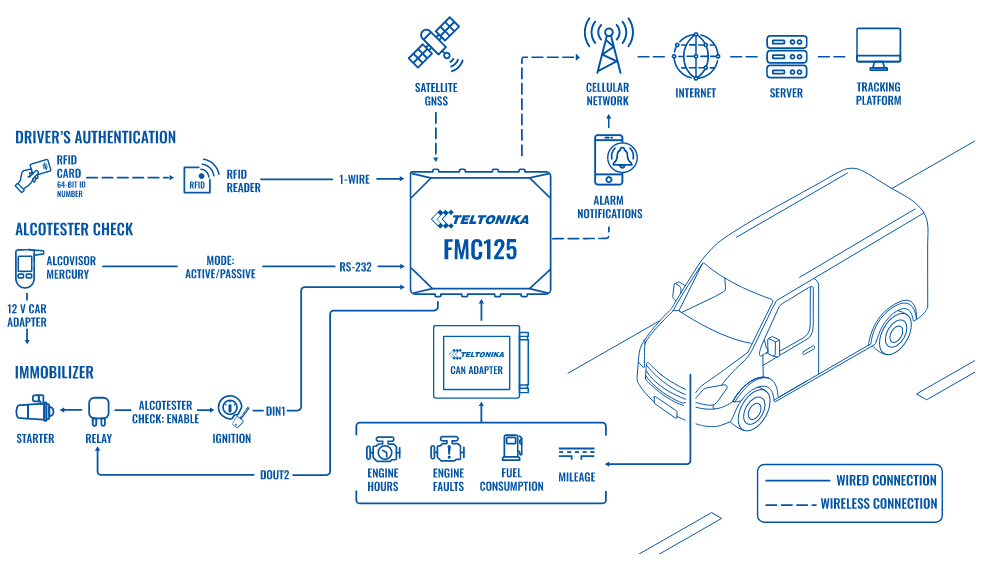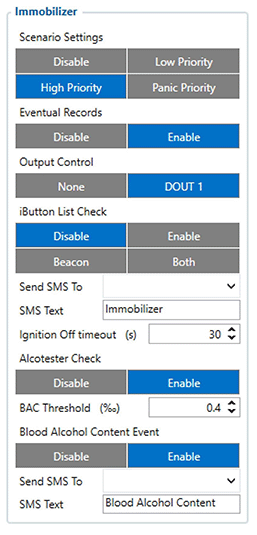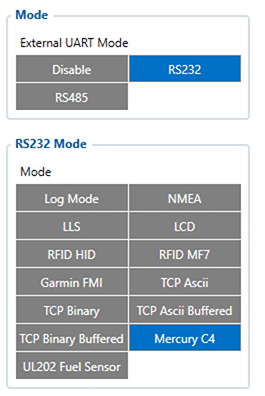VEHICLE IGNITION INTERLOCKING WITH BREATHALYSER AND GPS TRACKER
Introduction
Alcohol remains the most commonly used substance and addiction in many countries. Drivers with high blood alcohol concentrations are at much greater risk of traffic accidents. It means more crashes, property losses, injuries, and deaths. That is why corporate fleet drivers’ breath testing routine alongside comprehensive vehicle tracking and data monitoring becomes not only an attractive option but a smart investment.
Solution description
This solution includes driver’s authentication method based on the 1-Wire communication bus system combining contactless Radio-frequency identification (RFID) card, 1-Wire RFID reader, immobilizer scenario, SPECIAL category vehicle tracker Teltonika FMC125 and breathalyser Alcovisor Mercury for drivers’ blood alcohol content (aka BAC) limit checks and ignition interlocking. The latter communicates with a GPS device via serial port RS-232 and USB connector. The breathalyser uses an electrochemical fuel cell to measure the alcohol concentration from the sample of the expired breath from a driver. If alcohol is present, a corresponding voltage is generated from the fuel cell, which is proportional to the alcohol content of the sample provided. After that, the voltage level is converted to BAC respectively, which is then displayed. For a convenient power supply, it can be connected to a vehicle cigarette adaptor.
What you need for a solution?
- Teltonika tracker FMC125
- 1-WIRE RFID card and 1-WIRE RFID card reader
- Breathalyser Alcovisor Mercury
Installation
Both, the 1-Wire RFID reader and breathalyser have to be mounted inside the vehicle, connected to the Teltonika GPS device and set up accordingly. To start a vehicle engine, two steps must be passed successfully, one after another - driver’s authentication and alcotester check routine. If any of them fail, the ignition starter will remain disconnected to prevent driving. The relevant events data and alert notifications will be initiated and sent to a dedicated server and FM platform to be monitored by fleet management and/or the person in charge. To get through, every fleet driver is given an RFID card with a unique factory-programmed 64-bit identification number. When starting a shift, a person has to authenticate itself by bringing an RFID card nearer to a 1-Wire RFID reader. If it is successful, the next step - alcotester check procedure. To do so, a driver has to breathe in a reusable sampling cup attached to the sample port of a breathalyser. If alcohol is found in the breath sample, alcotester check fails which stops immobilizer authorisation. Finally, if both steps, driver’s authentication and alcotester check, passed successfully, the ‘start of shift’ event electronic date and time stamp will be generated and registered, an ignition starter engaged. Vehicle driving is authorised, and an employee is welcome to start his/her duties. If not, vehicle driving remains restricted, and a driver has to follow an internal company procedure for this matter. When a shift has finished, and a driver is done for the day, the RFID card has to be touched to a 1-Wire RFID reader again to generate an ‘end of shift’ electronic stamp, and now vehicle ignition can be switched off for good

Configuration
To make the ignition interlock work correctly, the FMC125 vehicle tracker has to be set up using Teltonika configurator. Firstly, the ‘Alcotester Check’ option has to be enabled within the ‘Immobilizer’ feature as shown below:

GPS tracker RS-232 mode with breathalyser Mercury model has to be configured allowing corresponding data communication between two devices. To provide an electrical connection, USB connector pins TXD and GND of Alcovisor Mercury should be connected to RS-232 port pins RXD and GND of FMC125 tracker accordingly. Also, the breathalyser unit has to be calibrated as advised by its manual.

The vehicle ignition interlock method can be successfully applied for most corporate fleets using light vans: telecoms, internet and cable service providers, utility service businesses, postal office, sanitation, construction, manufacturing and processing, non-food retail, wholesale companies and others.
Benefits
- Driving under the alcohol influence problem is resolved in corporate fleets once and for all with a minimum effort and maximum results
- Increased road safety – fewer alcohol-related road crashes, collisions, property losses, severe injuries and fatalities
- Improved loss ratio and enterprise profitability – by utilising the ‘Alcotester Check’ feature, corporate fleets will improve drivers’ habits, discipline and safety, lessens risky driving behaviours, accidents, cargo losses, repairs, maintenance, insurance and medical expense, and operational cost
- Extensive Teltonika GPS tracker functionality to serve company needs – abundant feature set, flexible configuration, CAN Bus readings, multiple usage scenarios and benefits, handy detections such as overspeeding, excessive idling, unplug, towing, crash help to compliment alcotester check functionality and optimise fleet management
- Hassle-free drivers’ authentication and time tracking, monitoring, and management – accurate and easy-to-use personnel clocking method utilising 1-Wire technology, relevant vehicle GPS trackers, and accessories. Data is accessible anytime and anywhere via PC, tablet, and smartphone
